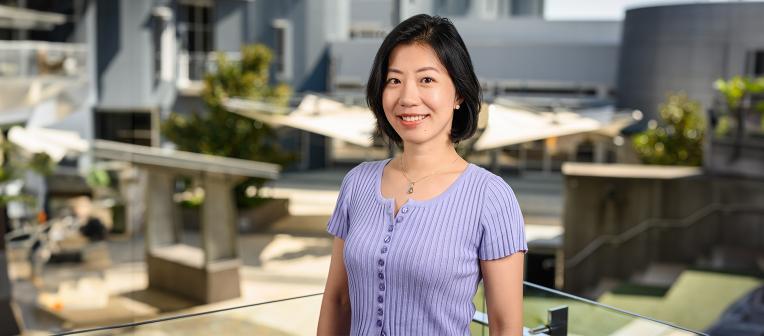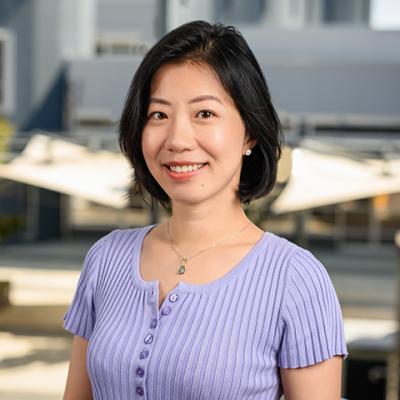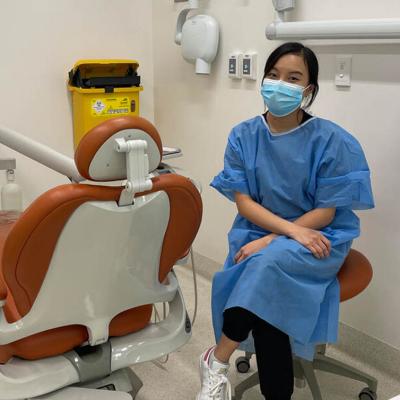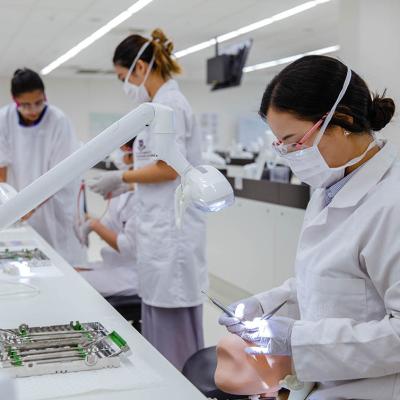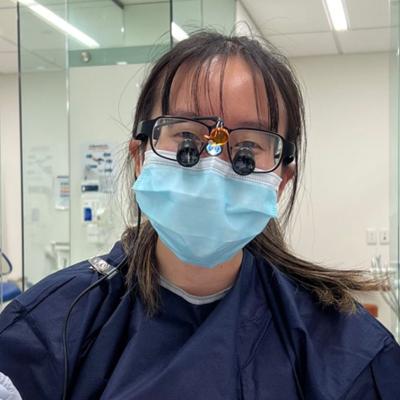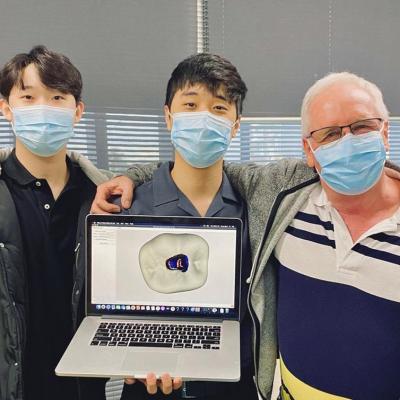Dr Yinghong Zhou is a Senior Lecturer in oral biosciences at The University of Queensland's School of Dentistry. She is committed to educating the next generation of dental professionals, and she strives to inspire her students by integrating her diverse background into the curriculum and emphasising the importance of a multidisciplinary approach to dental science.
But Yinghong's work extends beyond teaching as well. She's also actively engaged in research that stretches across her expertise in periodontology, osteoimmunology, and biomedical engineering.
We asked Yinghong some questions to explore her academic experience, her research interests, and her approach to teaching.
What was your journey to your current role in UQ's School of Dentistry?
My academic journey has been both diverse and enriching, allowing me to integrate various disciplines into my expertise in dentistry. Initially, I pursued my dental degree overseas, where I developed a deep interest in the complexities of periodontal health and disease.
To further my understanding and contribute to advancing dental science, I pursued a PhD in biomedical engineering. This interdisciplinary field allowed me to explore innovative approaches to dental care and research, particularly focusing on the interface between biological systems and engineering principles. My research during this period provided me with a robust foundation in cutting-edge technologies that are pivotal in modern dental practices.
What fuels your passion for your career, and what are you most passionate about?
My passion for my career is fuelled by a deep commitment to improving oral health outcomes, particularly in the field of periodontology. Periodontitis, as the leading cause of tooth loss, represents a significant challenge both economically and health-wise, with approximately 1 in 3 Australians affected by this debilitating condition. Witnessing the profound impact that periodontal disease has on individuals’ quality of life drives my dedication to advancing treatments and preventative measures.
What I am most passionate about is the potential to revolutionise the treatment of periodontitis through cutting-edge research and innovative approaches. My work focuses on developing individualised treatments that utilise bioactive molecules and materials. These advanced therapies aim to regulate the immune responses associated with periodontitis and promote the physical and functional repair of the periodontal tissues. By tailoring treatments to the specific needs of each patient, we can enhance the effectiveness and efficiency of periodontal care, ultimately improving patient outcomes.
"The knowledge that effective treatment can restore not only dental health but also overall wellbeing and confidence is incredibly motivating. Moreover, the significant economic burden that periodontitis imposes on healthcare systems further compels me to pursue research that can alleviate these costs through more effective therapies."
What's involved in your role at UQ?
At UQ, my role encompasses a variety of academic and research responsibilities that contribute to both the educational and scientific missions of the School of Dentistry. As the Course Coordinator for 2 key courses within the dentistry programs, I play a pivotal role in shaping the curriculum and enhancing the learning experience for our students.
Specifically, I coordinate the Molecular Biosciences for Dentistry course within the Doctor of Dental Medicine program and the Immunology and Microbiology for Dentistry course within the Bachelor of Dental Science (Honours) program. My responsibilities include:
- the delivery of comprehensive course materials
- the development of assessment items and rubrics
- ensuring that the course content is current and relevant to the evolving field of dentistry.
Additionally, I focus on creating an interactive and supportive learning environment that encourages student participation and critical thinking.
Beyond my teaching duties, I lead the ImmunoEngineering for Regenerative Dentistry Research Team. My role involves guiding the research directions of the team, supervising higher degree by research students, managing project milestones, and securing funding to support our innovative work. Our research is dedicated to exploring and developing advanced treatments that harness the host immune system's potential for the repair and regeneration of periodontal tissues, with the ultimate goal of improving patient treatment outcomes and quality of life.
In addition to my academic and research responsibilities, I serve as the External Engagement Chair at the Centre for Oral Regeneration, Reconstruction, and Rehabilitation (COR3). In this role, I oversee consumer and partner engagement initiatives, fostering collaborations with industry partners, healthcare providers, and the community. My efforts aim to bridge the gap between research and practical applications, ensuring that our work has a meaningful impact on both patients and society.
Through these diverse responsibilities, I am committed to advancing dental education, driving forward impactful research, and strengthening our connections with external stakeholders. My multifaceted role at UQ allows me to contribute to the development of future dental professionals while also advancing the ever-emerging field of regenerative dentistry.
What approach do you take to teaching, and what qualities do you take pride in as an educator?
My approach to teaching is grounded in the belief that education should address both the specific knowledge and skills required in dentistry and the broader life skills necessary for future professional success. I strive to create a learning environment that fosters critical thinking, professionalism, and lifelong learning.
I aim to develop each student's ability to critically evaluate scientific literature, clinical evidence and treatment options, which helps them make informed decisions and stay current with advances in dental science.
Instilling professional values and ethics is crucial. I emphasise integrity, empathy, cultural competence, and effective communication, which are essential for building trust with patients and colleagues.
I also encourage a mindset of continuous learning and professional development, which ensures that students remain engaged with the latest advancements in dentistry throughout their careers.
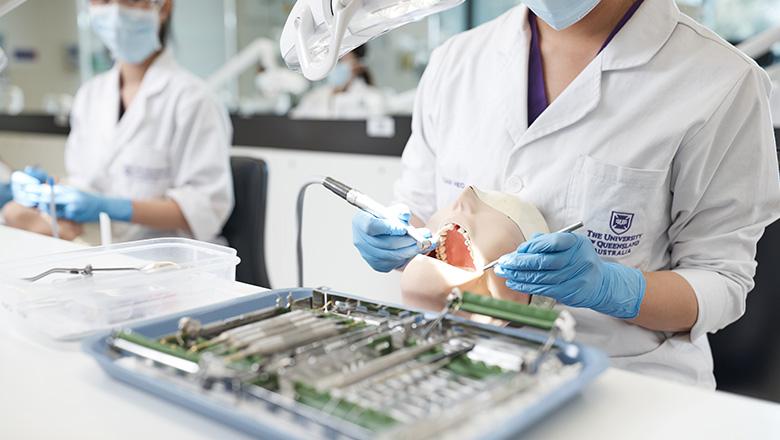
In my role at the School of Dentistry, I employ a variety of teaching and learning approaches tailored to the diverse needs of students and the specific demands of the field. These methods include:
- Hands-on pre-clinical and clinical training: Practical skills are essential in dentistry. Through extensive hands-on training, students gain the confidence and competence needed for effective patient care.
- Problem-based learning (PBL): PBL is a cornerstone of my teaching philosophy. By presenting real-world dental cases, students are encouraged to actively engage in problem solving, critical thinking, and clinical reasoning. This method promotes self-directed learning, mimicking the continuous learning required in professional practice.
- Active engagement and interdisciplinary collaboration: I emphasise integrating theoretical knowledge with practical application. Encouraging students to work collaboratively across different disciplines fosters a comprehensive understanding of patient care and prepares them for real-world scenarios.
Qualities I take pride in as an educator include prioritising the individual needs and learning styles of my students, providing support and guidance tailored to each student's development.
"Beyond formal teaching, I take pride in mentoring students, helping them navigate their academic journeys and career paths. This includes supervising research projects and guiding them through complex concepts and practical challenges."
Finally, I continuously seek out innovative teaching methods and technologies to enhance the learning experience. This includes staying updated with educational advancements and incorporating new tools and techniques into my courses.
In the realm of oral health sciences, what are your aspirations and the outcomes you aim to achieve through your work and research?
Periodontitis is a leading cause of tooth loss and affects a significant portion of the population, causing substantial economic and health burdens. My primary goal is to develop and refine treatment strategies that are more effective and efficient. This includes:
- Individualised treatment approaches: Utilising bioactive molecules and materials to create personalised treatment plans that cater to the specific needs of each patient. By regulating immune responses and promoting the physical and functional repair of periodontal tissues, we can achieve better outcomes.
- Regenerative Dentistry: Focusing on regenerative techniques that not only halt the progression of periodontal disease but also rebuild damaged tissues. This involves exploring new materials and methods that support tissue regeneration and repair.
What are some key trends and developments you've observed in oral health sciences work practices in Australia?
I would group these trends and developments into these categories:
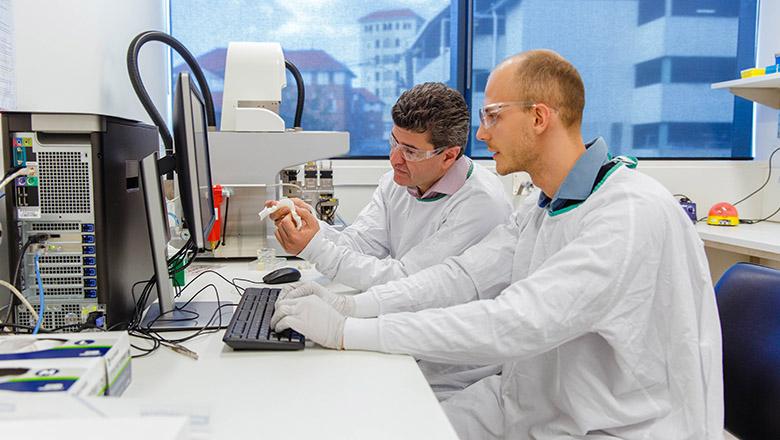
Evolving digital technologies like 3D printing are improving dental science practices and outcomes
Could you explain your area of research and what motivates you to conduct research in this field?
My area of research focuses on advancing treatments for periodontal diseases through the use of bioactive molecules and materials.
In simpler terms, I study ways to improve how we treat gum diseases like periodontitis. These diseases can lead to tooth loss and affect many people's overall health. Instead of just treating the symptoms, I look at using special substances that can help heal and rebuild the tissues around the teeth.
What drives me to research this is the opportunity to make a real difference in people's lives. Periodontal diseases can be very serious, affecting not just teeth but also overall health. By finding better ways to treat these diseases, I hope to improve patients' quality of life and prevent them from losing their teeth.
It's incredibly rewarding to know that my work could contribute to healthier smiles and better health outcomes for many people. Additionally, being at the forefront of research means I get to explore new ideas and innovations that could change how we approach dental care in the future. This constant pursuit of knowledge and improvement in oral health care is what motivates me every day in my research.
Ready to start or continue your own academic journey in dental science?
Explore UQ's Bachelor of Dental Science (Honours) Explore UQ's Doctor of Dental Medicine

